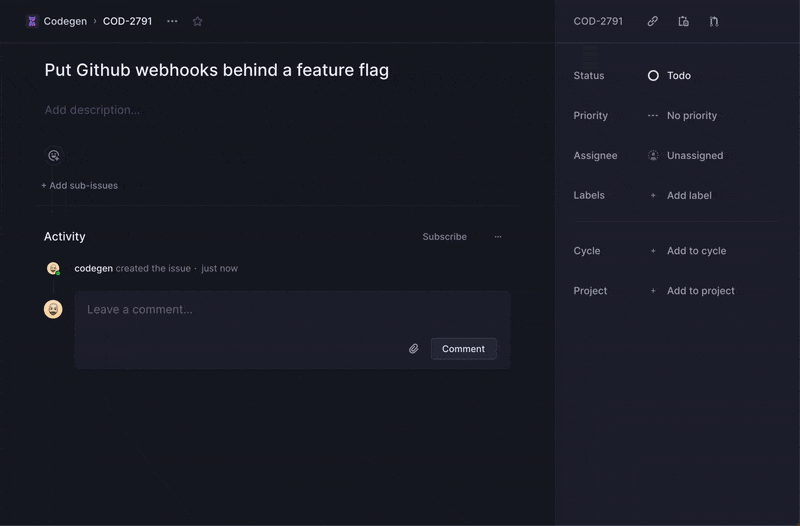TL;DR:
- Codegen, led by AI researcher Jay Hack, leverages large language models (LLMs) to automate software engineering tasks.
- Unlike other AI solutions, Codegen focuses on addressing complex codebase-wide issues like large migrations and refactoring.
- The platform connects with codebases and project management tools, generating pull requests to resolve support tickets.
- Codegen aims to strike a balance between AI automation and human oversight to ensure code quality and security.
- A recent funding round of $16 million led by Thrive Capital values Codegen at $60 million post-money.
Main AI News:
In the ever-evolving landscape of software engineering, the pursuit of increased productivity and efficiency is a perpetual goal. Jay Hack, an AI researcher with expertise in natural language processing and computer vision, embarked on a journey to harness the power of large language models (LLMs) like OpenAI’s GPT-4 and ChatGPT to revolutionize the way developers work. His vision? To enable LLMs to interpret natural language requests and translate them seamlessly into code, ultimately streamlining the software development process.
Jay Hack’s journey began at Palantir, where he honed his skills as a machine learning engineer. Afterward, he ventured into the world of entrepreneurship, founding and successfully selling Mira, an AI-powered cosmetics shopping startup. Armed with his newfound experience, Hack delved into the realm of LLMs, experimenting with their potential applications in executing pull requests, the pivotal process of merging new code changes with main project repositories. With the assistance of a dedicated team, Hack’s experiments evolved into the robust platform we know today as Codegen.
Codegen, a cutting-edge platform, seeks to revolutionize software engineering by automating a wide array of repetitive and mundane tasks, thanks to the power of LLMs. Hack emphasizes, “Codegen automates the menial labor out of software engineering by empowering AI agents to ship code, allowing companies to move significantly quicker and eliminate costs associated with tech debt and maintenance, thereby enabling a sharper focus on product innovation.”
But what sets Codegen apart from other code-generating AI solutions like GitHub Copilot, Amazon CodeWhisperer, and Salesforce’s similarly named model? Hack cites the specific challenges Codegen tackles. While the aforementioned solutions primarily focus on code autocompletion, Codegen addresses more comprehensive “codebase-wide” issues, such as large migrations and refactoring, which involves restructuring an app’s code without altering its core functionality. Hack elaborates, “Codegen leverages a multi-agent system for complex code generation, orchestrating a swarm of agents that collaboratively decompose and solve large tasks. This collaborative approach yields significantly superior outputs.“
At its core, Codegen offers a versatile cloud and on-premises tool that seamlessly integrates with codebases and project management platforms like Jira and Linear. It excels at automatically generating pull requests to address support tickets and can even set up essential code infrastructure and logging. While the term “infrastructure” may warrant further clarification, Hack’s intent is clear: Codegen provides a higher level of automation, scraping a company’s backlog to identify solvable tickets and subsequently deploying an army of agents to locate the relevant code and generate a pull request.
However, it’s crucial to acknowledge that even the most advanced AI models today are not infallible. Generative coding tools have been known to introduce insecure code, raising concerns about security vulnerabilities. In response, Hack emphasizes Codegen’s commitment to striking the right balance between human oversight and best practices for monitoring LLM-generated code. He underscores the importance of developing a comprehensive understanding of how to evaluate and verify LLM output to instill widespread developer trust in automated code generation systems.
Investors have shown significant confidence in Codegen’s potential. The company recently announced the successful closure of a $16 million seed round, with Thrive Capital leading the way and contributions from notable angel investors, including Quora CEO Adam D’Angelo and Instagram co-founder Mike Krieger. This funding round has propelled Codegen’s total raised capital to $16.2 million and established the startup’s post-money valuation at an impressive $60 million.
Philip Clark, representing Thrive Capital, shared his perspective, stating, “In 2023, most developers still spend an unreasonable share of their time writing code to deal with low-level tasks like migrations, refactors, integrations, and bug fixes. Companies like Codegen are leveraging LLMs to build AI agents that free engineers from this drudgery. Developers will soon be able to hand off jobs to agents so that they can stop worrying about software toil and stay focused on creating new products.“
While Codegen is currently incubating its platform with two large-scale enterprise partners and has yet to secure paying customers, Jay Hack anticipates significant growth in the upcoming year. Codegen is poised to seize the opportunity presented by this emerging landscape, channeling the newly acquired capital to expand its workforce from six employees to ten by year’s end. As the software development industry continues to evolve, Codegen stands at the forefront, poised to redefine the way we approach software engineering tasks.
Conclusion:
Codegen’s innovative approach to automating software engineering tasks, backed by substantial funding and support, signifies a transformative shift in the market. As the company continues to refine its AI-driven solutions and expand its workforce, it is poised to lead the charge in improving efficiency and productivity within the software development industry, ultimately reshaping how developers approach their work. This development highlights the growing importance of AI-driven automation in the software engineering sector, with Codegen at the forefront of this exciting evolution.

